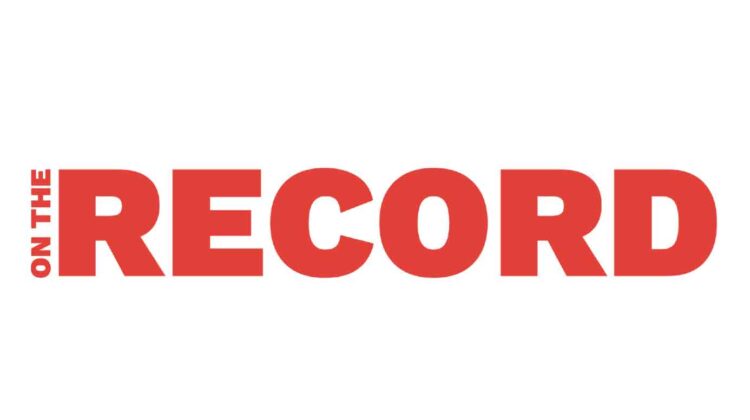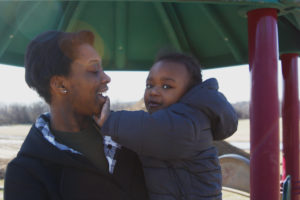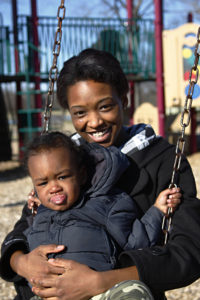
LOCAL TEENAGE MOMS AND MOMS-TO-BE FIND REFUGE IN THE LOUISVILLE TEENAGE PARENT PROGRAM SCHOOLS
Local teenage moms and moms-to-be find refuge in the Louisville Teenage Parent Program schools
Words by Cameron Daniel and Melissa Scianimanico|May 26, 2017
Renée Sturgeon, a soon-to-be mother in the Louisville Teenage Parent Program (TAPP), was not surprised when her sleep was again interrupted by the pressure on her bladder. Midnight bathroom runs had been a common occurrence throughout Renée’s pregnancy, even more so as her due date approached. But, as she rolled out of bed, it was apparent that the night of June 29th would be different.
Renée was used to restless nights filled with back pains and snack cravings, but the dampness on her sheets and the trickle of liquid down her leg caught her completely off guard. Renée’s body was now controlled by her baby’s will, and, to be honest, her mere 15 years of life had not prepared her for the massive physical changes the tiny being inside her was capable of inducing. What was this uncomfortable dampness on her pajama bottoms? She wasn’t quite sure; she would ask mom in the morning. Mom always knew the answer. So, dazed and distressed, Renee went back to bed.
In the morning, Shelley Sturgeon went to peek in on her two teenage children as she always did, especially considering her daughter Renée’s approaching due date. When she saw that Renée was uncharacteristically awake at 9 a.m. on a summer morning, she knew that something was amiss.
After an emergency call to Renée’s doctor and a rushed car ride to the hospital, Renée was shocked to learn that her water had broken in the night. This was it; she was in labor.
“That’s when it all got real. Everything happened in 12 hours,” Renée said.
By 9:25 that evening Renée was a mother, but she was also still a student, still a dependent, and still a child. Labor broke down the tough façade Renee had constructed throughout her pregnancy; in fact, it took the birth of Stella to falter Renée’s previously unshakable mindset.
“Labor was the moment when I realized I was taking on so much. I was freaking out, crying. I was so scared. I finally knew I couldn’t do this alone,” Renée said.
THE NATIONAL ISSUE
Although the teenage birth rate in the U.S. has fallen almost continuously since 1991 and is now at historic lows, Renée is part of the nearly 750,000 American teenagers who become pregnant each year, according to the Centers for Disease Control and Prevention. And the National Campaign to Prevent Teen and Unplanned Pregnancy says that only about half of teen mothers will get their high school diploma by age 22.
When Stephanie Adams, an alumnus of South Park TAPP, found out she was pregnant at 17, she feared becoming a part of those statistics.
“If it wasn’t for TAPP I would have never graduated. I was literally flunking out of school when I was pregnant,” Adams said.
In order to combat this issue directly, the Louisville Teenage Parent Program (TAPP) schools were created in 1970. Located in Westport and South Park, the TAPP schools function as pathways that cater to the unique needs of teenage mothers like Renée. School services include childcare, family support and counseling, career pathways, transportation, and access to on-site medical care, allowing attendees to prosper both as students and as mothers.
“Honestly, if it weren’t for TAPP I don’t think I would be able to stay in school, let alone dream about going to college,” said Renée, now a 16-year-old sophomore at TAPP.

TAPP works to help alleviate America’s nearly 60% national high school dropout rate for teen mothers, as well as to eliminate the obstacles these girls face, with the ultimate goal being graduation and higher education. The school implements various unique educational programs to help reach this goal. For example, the TAPP-exclusive program Project Science Math And the Right Technology (SMART), requires an application as well as an 85% attendance rate and at least a 2.0 grade point average. Members of Project SMART can attend college tours and job shadowing trips that can help them discover their interests and propel them into the workforce.
Before girls can begin thinking about college, they must start at step one: balancing motherhood along with their education.
CHILD CARE
One of TAPP’s biggest attractions for teen moms is its publicly-subsidized, on-site child care that works with babies two weeks to three years of age. This service doubles as both a daycare and a learning facility for the children of students enrolled in the TAPP Program.
“I love the daycare. They are able to introduce my son and me to new things. I would never have given my one-year-old son a paintbrush if it weren’t for this program,” said Andrea Patterson (18), a senior at Westport TAPP.
While the daycare is 100% free of charge for TAPP students, this has not sacrificed the quality of care children receive. The facility is federally approved and rated by the Stars for Kids Now! system, which ensures the safety and legitimacy of daycares across Kentucky.
“Just trying to do homework was crazy, so knowing that there was a place where I could go to school and keep my baby boy safe without having to pay for childcare took such a weight off my shoulders,” Adams said.
Although the babies are a significant aspect of the TAPP school experience, interaction between students and their children is rare and frankly discouraged throughout the school day, save for breastfeeding and cases of emergency.
“Our onsite daycare facilities allow moms to breastfeed and have that nurturing mother role, while also being able to multitask and complete their high school diploma,” said DeLena Alexander, the principal of both TAPP schools.
But even with TAPP’s efforts to offer childcare during the school day, students’ studies are inevitably interrupted by other demanding and sometimes unexpected realities of teenage motherhood. Whether it’s frequent doctor appointments or sudden waves of nausea, it is likely that health concerns will distract students from their work. Fortunately, TAPP’s on-site, fully functional medical clinic allows mothers and their babies to receive professional medical care from University of Louisville residents without leaving campus.
“It really helps us with attendance because girls don’t have to miss school for a doctor’s appointment,” said Whitney Stewart, the academics advisor at the TAPP schools.
Recently, Principal Alexander decided to expand the clinic’s services by adding WIC or Women Infant and Children, a food assistance program that provides nutrition education and services, breastfeeding promotion and education, and access to maternal, prenatal and pediatric health-care services.
“Typically,” Stewart said, “you would sign up for WIC at a Neighborhood Place, like a local clinic, which are located in certain communities that some girls can’t get to.”
Students can now reap the benefits of the WIC program, such as health screenings and health education, while also being able to attend a full day of school.
STUDENT-TEACHER CONNECTION
TAPP also works to improve the lives of students outside of the classroom. Adams enrolled at TAPP when she was 17 and pregnant with her first son.
“I was very quiet, dealing with home stuff,” Adams said. “But I knew if I needed them, the counselors would be there for me, and I could see that because I was failing my junior year and they pulled me through that.”
TAPP’s Family Programs sector was created just for that purpose – to offer a support system that can benefit student success in both academic and family life. The Family Programs’ staff members help point students towards programs that can cater to their individual needs, such as aid for food, housing, clothing, and even utility bills.
The intimate interactions that are fostered through these programs create an environment that is unique from that of any other academic atmosphere, which allows for students and staff to engage in profound relationships.
When the last bell rings at 2:20, most students race out of their classes to finally return home after a full school day. Most students wouldn’t delay their departure for a personal conversation with their teacher. Most students, however, do not have student-teacher relationships similar to the ones developed at TAPP.
When the end-of-day bell rings at Westport TAPP, Stewart walks down the halls of the child care wing. A wave of students flows into the hallway as smiling girls make their way to pick up their children. As each girl passes by, Stewart’s face melts into a gentle smile that the girls reciprocate immediately. Despite their eagerness to see their babies, students stop to casually talk to Stewart about their classes and personal lives.
One student waves Stewart down to introduce the counselor to her mother, who was visiting the school that afternoon.
“Ms. Stewart’s like a big sister to me, she’s always checkin’ on me,” the student said.
“That’s right, I’m always here to make sure she’s doin’ well,” Stewart said playfully, bumping the girl on the hip.
“Bye, Ms. Stewart,” the girl waved and smiled.
The supportive environment that TAPP fosters radiates throughout the students’ personal lives as well as within the walls of the Louisville TAPP schools. This support, paired with TAPP’s unique programs, encourages students to both attend and excel in school.
Alexander is aware that her girls have more hardships than most and has found it helpful to offer incentive programs to encourage the students to show up to school.
“They get to shop with attendance dollars, so every day they come to school they get a dollar point,” Stewart said.
“Dollar points” allow students to “shop” in a store of donated items.
“They are able to give me things I need, like diapers, wipes, clothes for me, and clothes for my baby,” Patterson said.
HOW TO BE A MOTHER
In addition to the goods and resources that will improve their babies’ lives, TAPP also tries to impart the knowledge its charges will need as students and parents.
Along with regular middle and high school courses, TAPP provides classes in prenatal and postpartum care, family planning, child development, child care, and parenting skills.
“They made toys for the baby and they even learned how to do a growth chart. The class is teaching Renée things I didn’t even know after having two kids,” Shelley said. “It’s interesting because obviously these girls benefit especially from that class, but it’s almost like any girl or boy should be taking that class, so we’re really lucky that TAPP was able to offer that for her.”
When Renée and her newborn child Stella returned home from the hospital, Renée was immediately struck by the realization that this was going to be a difficult process. Suddenly, her nights were dictated by her daughter’s sleeplessness, and her days were spent in an exhausted blur.
Those early hours of the morning were the moments that she found herself questioning: Where do I go from here? Why is she crying? What do I do?
She had so much to learn, so much work ahead of her.
“That first week was horrible because you’re in so much pain from giving birth and you still have to wake up every two to three hours to feed her in the night, and you’re learning everything. It’s hard,” Renée said.
TAPP’s childhood development classes help to relieve some of the stress of these first difficult weeks of motherhood, teaching the students vital information on what to expect and how to react. Renee believes that these classes equipped her with skills that helped her navigate through the confusing process of motherhood, all in an environment free of condemnation.
“One thing that I do really enjoy about being here at TAPP is that I can feel and I can see when my work is impactful,” Stewart said. “I feel like outside of school, girls can experience shaming from parents, peers, religion, whatever, but I feel like here it’s not like that. So that contributes to being able to create more intimate relationships.”
Typical high school courses such as home economics and family consumer science take on a whole new meaning for TAPP students. While these classes may not seem relevant to an average student, the girls at TAPP are able to directly reap the benefits.
“It’s one thing to tell these girls ‘one day you will need this,’ and it’s something totally different to say ‘when you go home, you are going to know how to feed your child right now,’ or ‘when you go into labor, you can use these skills right now,’ or ‘when you’re planning your budget for you and your child trying to pay for daycare, you can use this right now,’” said Kameron White, a family consumer science teacher at TAPP.
White emphasized that her teaching style did not change when she began teaching at TAPP, and that TAPP’s academic environment is comparable to that of any high-performing school.
“I don’t do anything differently because being a parent doesn’t make you incapable of doing the work,” White said. “I don’t want them to get comfortable with being treated differently because they have a special situation.”
This mindset has allowed TAPP students to defy the stereotypes, to defeat their unique challenges, and to become successful young students, mothers, and people.
“If TAPP weren’t an option, I don’t think I’d be in school. Once I had her, I didn’t think I could go back,” Renée said.
AFTER TAPP

Now, after attending South Park TAPP for nearly a year, Renée is set on attending nursing school at Spalding University after she graduates. She now understands the hardship
s of motherhood, as well as all of its overwhelming triumphs. The fears that she faced on the eve of her child’s birth have transformed into pure adoration for her daughter.
“It’s awesome. I wouldn’t wish it for anybody this young, but being amom is the best feeling in the world. I wouldn’t trade her for anything,” Renée said as she looked towards her sleeping child with a smile.
In 1989, 17-year-old Stephanie Adams was in the same position as Renée. Now, 18 years later, she walks into her kitchen each morning before her job as a closer at Amerisave Mortgage Company and makes breakfast for her children. Her youngest daughter, McKayla, may grab a little coffee mug for her morning hot chocolate, a little mug that Adams had earned at her high school graduation ceremony.
“Be careful with that, that’s important to me,” Adams says to her child for what seems like the hundredth time.
This mug isn’t just a little mug, it’s a symbol of her triumph.
“Getting that little mug meant a lot. I knew I did it: I had a baby and I graduated,” Adams said with a smile; a smile that was proud, a smile that was dignified.